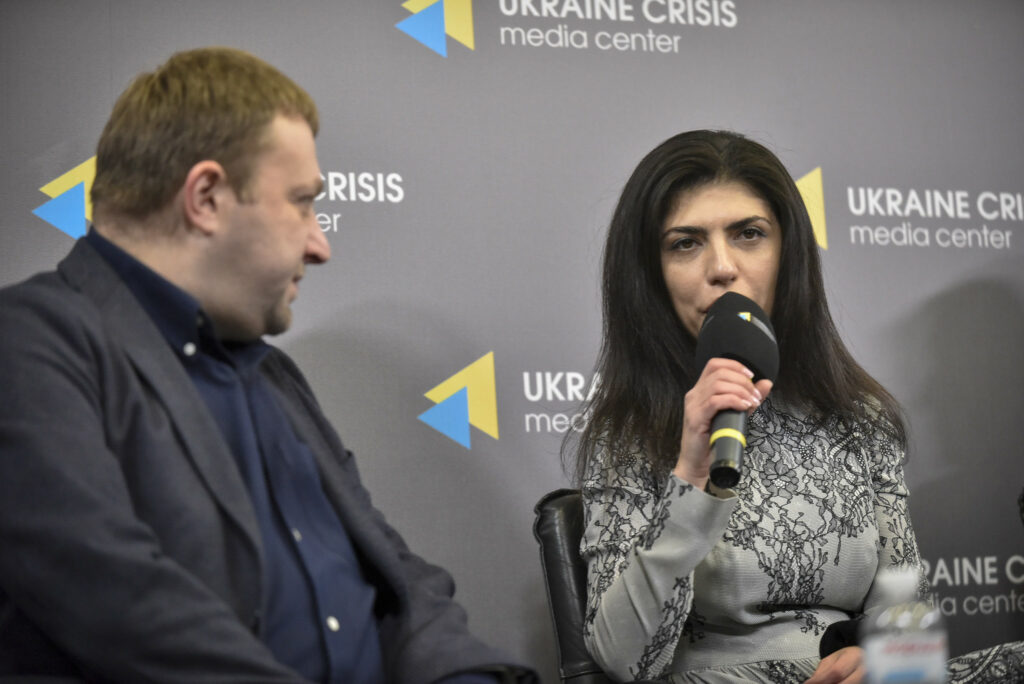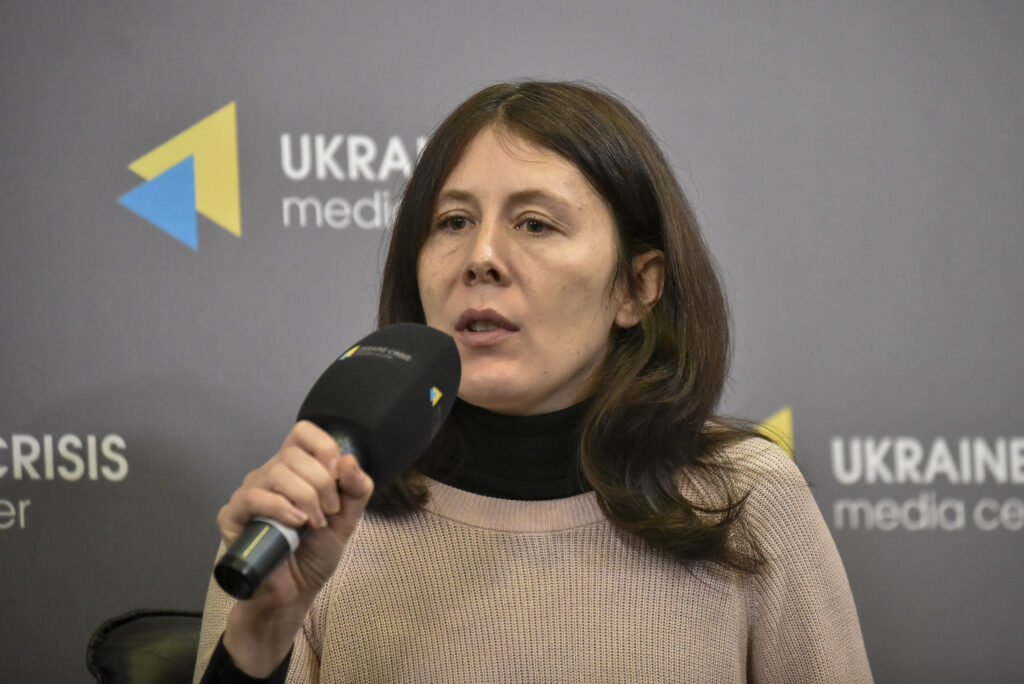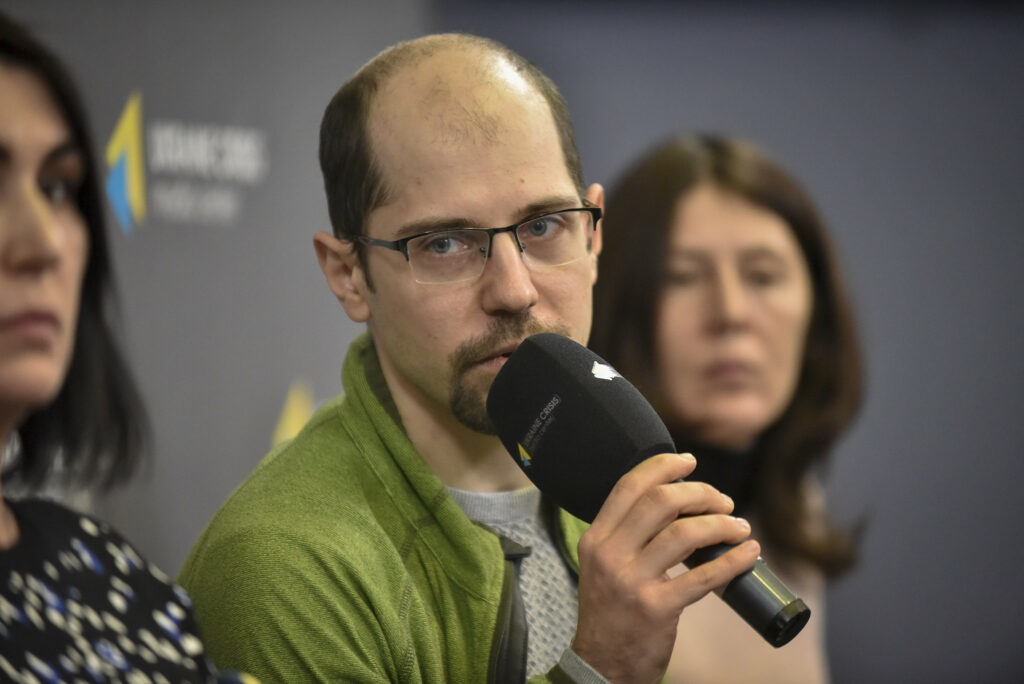The Ukrainian group Razom We Stand initiated a press briefing “Will the new US and EU sanctions stop Russia’s liquefied natural gas exports?” at the Ukraine Crisis Media Center. At the beginning of the event, its moderator Maksym Gardus announced that on November 2, the USA finally imposed sanctions against the Arctic LNG-2 project, which is important for Russia. “What does this mean and how will these sanctions affect Russia’s European counterparties?” – he asked Agia Zagrebelska, Head of the Department for Minimization of Corruption Risks in the NACP Sanctions Policy.
“We realize that there may be some exceptions, but in general we expect these sanctions to undermine Russia’s plans of becoming an undisputed leader in the LNG market in the beginning of 2024, when the project is launched. I hope we won’t see European companies in this project in the near future. Although the French side has said that they are still scrutinizing the situation, the American sanctions are only the beginning. Everyone saw the resolution of the European Parliament as of November 9, where the European Parliament spoke quite clearly on the Arctic LNG 2 project,” she answered.
Agia Zagrebelska emphasized that the imposition of such sanctions is not only a matter of the Russian-Ukrainian war. This is a matter of national security of every country, because wherever Russia appears with its natural resources, its money, its companies, Russian spies, Russian corruption and Russian interference in the internal politics of these countries appearы there too.
Darya Shapovalova, Director of the Energy Law Center of the University of Aberdeen, for her part, noted that there has been an opinion in Europe and Scotland that liquefied gas will be out of sanctions, but the latest events in the European Parliament are a very important signal for the market. “The LNG market is growing. It’s very important that the resolution that was passed calls on the EU member states to completely close the market for LNG and introduce a total ban on LNG imports and exports. Besides, they say directly that the EU and its member states must expand the sanctions on aluminum imports,” she added.
Liudmyla Yenina, director of the Department of Economic Diplomacy at the Ministry of Foreign Affairs of Ukraine, drew attention to the fact that the European Parliament’s resolution expresses concern about the existing loopholes in the European Union’s sanctions regime against Russia.
“The document calls on EU member states to thoroughly inspect if companies comply with export restrictions on sanctioned goods and impose tangible fines. Export control must be expanded to cover more product categories,” Liudmyla Yenina emphasized.
The Ukrainian expert community and public organizations made a lot of efforts to get Russian LNG on the EU sanctions list. But in Europe there are different opinions on this matter. So, in Spain they said that they do not yet see a solution to this issue in the short term. Europe is very afraid of a price jump. Until 2022, the EU countries had 19% of LNG in their balance sheet, whereas now this indicator has grown up to 39%. This is what prevents such restrictions from being introduced. However, in the future, the market situation may change. Olena Lapenko, Dixi Group energy security expert, expressed this opinion
“Along with the USA, Qatar offers its services, but these capacities will be available not earlier than 2025. However, long-term contracts with France, Italy, and the Netherlands have already been concluded, and we hope that this is only the beginning,” she explained.
Svitlana Romanko, Director of Razom We Stand, is convinced that the United States is aware of its political power. They can close many important loopholes in the sanctions, for which, relatively speaking, Ukraine continues to pay with the blood of its soldiers. However, there are significant obstacles to the effective imposition of sanctions on the Russian Federation, as was the case with the oil market.
“The oil price cap has not worked for a long time. There are gray areas and offshores such as the United Arab Emirates, where there is a complete corrupt merger of interests. The presidents of the largest oil companies lead climate change conferences and have joint projects with Russians in the Persian Gulf. And this plays the role of time-bombs that threaten not only with a huge climate crisis, but also a crisis of democracy,” the Director of Razom We Stand noted.Oleh Savytskyi, senior manager of the group commented on the logistics situation.
“The logistics of Russian liquefied gas is delicate and vulnerable to sanctions. If there was political will, it could be cut instantly. The RF tanker fleet consists of 15 vessels built in the last 8 years. All of them are known. These are icebreakers-tankers designed to sail in the Arctic Ocean, which are significantly more expensive than conventional LNG tankers, and Russia is dependent on key transshipment points. And thanks to the fact that European companies allow Russia to deliver gas to world markets with its ships, it has the opportunity to earn very significant profits. Only one port in Belgium allows Novotek to transport about 6 million tons of LNG,” he said.
However, as the expert noted, America has taken a course to destroy the LNG industry in Russia, and there is every reason to say that it will not stop at sanctions against Arctic LNG-2, and will introduce sanctions against the current Yamal project. as well as LNG tankers, but this will take some time.
At the end of the briefing, Svitlana Romanko urged to continue fighting for the introduction of sanctions against the aggressor country, as they bring effects.
“Recently, the Russians have been actively talking about the fact that sanctions against them do not work. In fact, they act and deeply undermine the economy of the Russian Federation. It just doesn’t happen instantly, she explained. – According to the World Bank and the International Finance Corporation, Russia’s GDP fell by almost 2.5%. For a country that draws its finances from almost one source, this is quite a lot. Therefore, it is necessary to continue to work on the imposition of sanctions, and take into account that despair that sanctions do not work is only a narrative of Russian propaganda.”





